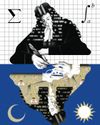
There are a few things in our culture that almost no one dislikes. Dolly Parton, fried rice... I can think of something else, too. For this item the constituency is smaller-you probably have to go to college to want to vote on it-but really, it, or she, should be included: the Wife of Bath, from Geoffrey Chaucer's "Canterbury Tales." With "The Canterbury Tales," which Chaucer wrote during the last decade or so of his life he died in 1400, leaving it unfinished he went a long way toward inventing the novel. Actually, scholars don't agree on what the first novel was, but, more than any other work preceding it, "The Canterbury Tales" has a trait, in abundance, that people look for in a novel and miss if it's not there: the noise and bustle of real human life, the market-square color and variety that you find in "Tom Jones" and "Middlemarch" and "War and Peace" indeed, in most of the works that we reflexively think of as great novels. One might even say that "The Canterbury Tales" has too much human life, too many characters: some thirty late-medieval people who are going on a pilgrimage to Canterbury Cathedral and who decide to pass the time by taking turns telling stories.
Among them is the Wife of Bath, Alison by name, a clothmaker-well off, well travelled, well dressed, riding a nice horse. Alison is a sort of distillation of the work's chief novelistic qualities, its realism and its immediacy. As she speaks, you can almost feel her breath on your neck. And it's not just medieval life she's talking about. Her story is also a summary of much of the important literature available to people of the Middle Ages, the stories that taught them who they were. Alison is a whole syllabus of human wishes and grudges, blessings and curses a Divine Comedy, a Metamorphoses, a Decameron, even. (She alludes to all of these sources.)
Diese Geschichte stammt aus der February 13 - 20, 2023 (Double Issue)-Ausgabe von The New Yorker.
Starten Sie Ihre 7-tägige kostenlose Testversion von Magzter GOLD, um auf Tausende kuratierte Premium-Storys sowie über 8.000 Zeitschriften und Zeitungen zuzugreifen.
Bereits Abonnent ? Anmelden
Diese Geschichte stammt aus der February 13 - 20, 2023 (Double Issue)-Ausgabe von The New Yorker.
Starten Sie Ihre 7-tägige kostenlose Testversion von Magzter GOLD, um auf Tausende kuratierte Premium-Storys sowie über 8.000 Zeitschriften und Zeitungen zuzugreifen.
Bereits Abonnent? Anmelden

MEAN TIME
“Hard Truths.”

ENLIGHTEN ME
The secret beauty of mandalas.

THE BEST OF THEM
His was a genius for the ages. Will Gottfried Leibniz ever get his due?

DEATH CULT
Yukio Mishima’ tortured obsessions were his making—and his unmaking.

Prophecy
The night of Dev’s twenty-second birthday, he was invited to sit with the elders after dinner.

A TALE OF TWO DISTRICTS
Lauren Boebert and Colorado’s red-blue divide.

THE TIKTOK TRAIL
Andean migrants draw others to the U.S. with videos depicting themselves as living the American Dream.

LOVE AND THEFT
Did a best-selling romantasy novelist steal another writer's story?

OUR NEW TWO-FACTOR AUTHENTICATION SYSTEM
Our two-factor authentication system is expanding because text messages and e-mailed codes are becoming less secure. Also, we’re committed to making sure your log-in process is more of a hassle than it needs to be.

STILL PROCESSING
Why is the American diet so deadly?